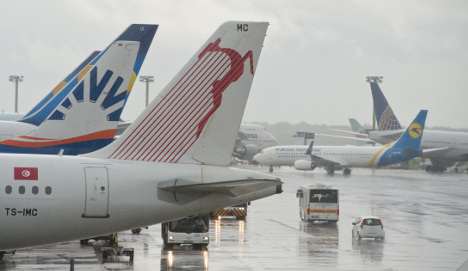The 40-year concession covers most of Greece's top travel hubs including Thessaloniki, Hania in Crete, and other islands such as Mykonos, Corfu, Rhodes and Santorini.
The deal, which includes a further 10-year lease option, had been approved by the previous Greek government but was put on hold after the hard-left Syriza party of Prime Minister Alexis Tsipras came to power in January.
The government gazette on Tuesday published a decree indicating that the government “approves” privatization agency Taiped's decision to award the concessions to Fraport along with a leasing agreement totalling €22.9 million a year.
However, the contracts have yet to be signed and talks are still ongoing, the company said.
Fraport “does not expect the deal to be finalised this year”, a company spokesperson told AFP.
It is the first privatization announced since eurozone ministers approved on Friday a massive new bailout for debt-laden Greece.
The Tsipras government has agreed the privatations of public assets as part of the deal reached its international creditors to win a third international bailout since 2010 worth €86 billion, approved by parliament on Friday.
The creditors demanded the creation of a €50 billion euro privatization fund – notably concerning ports, airports and railways – to be managed by Athens but supervised by the international institutions.
In November, Fraport had issued a statement saying it had won a “privatization offer” for the airports, which also include Cephalonia, Zakynthos, Aktion, Kavala, Kos, Samos, Lesbos and Skiathos.
The company has pledged to sink €330 million into the airports during the first four years, and invest €1.4 billion during the lease's 40-year duration overall.
Greece's regional airports run a brisk business handling millions of tourists, mainly heading to island destinations.
According to the association of Greek tourism enterprises, Rhodes in 2014 accounted for over 1.9 million arrivals, followed by Thessaloniki with 1.5 million and Corfu with 1.0 million.
Many of the airports, however, are decades old and undersized to handle the demand, a fact not lost on Greek tourist operators who have long demanded an upgrade of facilities.
'General sale of Greece'
But hardline Syriza dissidents reacted angrily to the airport concession announcment, saying it was the first step towards “a general sale of Greece”.
The governor of the Ionian isles, elected on Syriza's ticket, also criticised the deal as “contrary to local and national interests.”
“This is an exceptionally negative development,” said governor Theodoros Galiatsatos, whose area of responsibility includes the airports of Corfu, Zakynthos, Cephalonia and Aktion.
He added that he would call a referendum on the issue and seek to block the decision in court.
Unions have also expressed opposition to the deal.
The Osypa union of civil aviation staff has already announced plans to contest the deal at the European Union's competition watchdog, claiming that it will place the industry solidly under German control.
Osypa also claims the Greek state currently earns €450 million from the aiports each year, and that the €330 million promised by Fraport in investment barely exceeds the annual maintenance cost of €5.8 million euros per airport.
The government had originally frozen the airport deal upon coming to power in January, saying it wanted to review it in order to maximise local jobs creation.



 Please whitelist us to continue reading.
Please whitelist us to continue reading.
Member comments